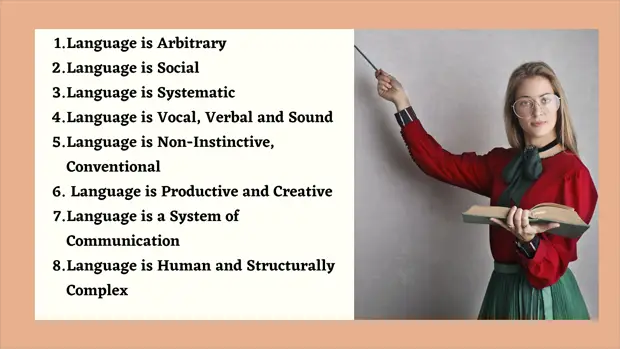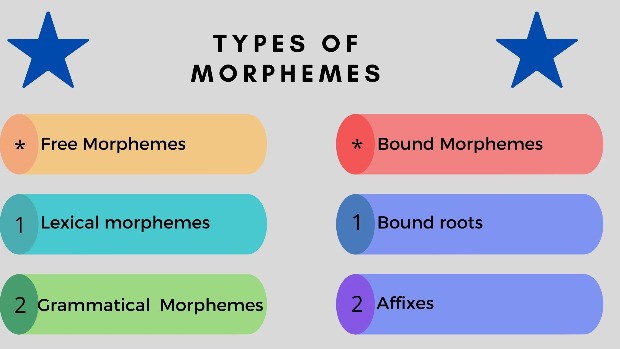If you are a language student, you must have to learn the Characteristics of language. Language is the most powerful and dominant system of communication.
In addition, language is the system of conventional, spoken, and written symbols using which human beings communicate with each other, from one country to another country or one culture to another culture. It is the best way to express emotions, thoughts, feelings, and desires.
With the change of time, language is also being changed in its form. Language is human, so it differs from animal communication in several ways. Every language has its characteristics and objectives.
Characteristics of Language
Quick Navigation
Let us know the characteristics of language in brief: language is arbitrary, productive, creative, symbolic, systematic, vocalic, social, non-instinctive, and conventional; language is a system of communication, and language is human structurally complex and adaptable.
10 Characteristics of Human Language
The ten characteristics of a language are given below. Please read carefully for proper understanding.
1. Language is Arbitrary
There is no inherent relationship between the nature of the things or concepts the language interacts with, which proves that language is arbitrary. Although such items and concepts are expressed, there is no reason different societies should pronounce the “same phrase” differently.
It is arbitrary for a term to be used to describe a certain thing or concept. It should be noted that if language had not been chosen at random, there would have been only one language left in existence today. We can think of language as an arbitrary vocal symbol because of this.
2. Language is a Social Phenomenon
In a sense, language should be considered a social phenomenon. Language is social in our human society; it is a means of nourishing and developing culture and establishing human relations.
As a member of a particular social group, we human beings interact with each other, allowing us to identify with one another and connect and coordinate with one another. This is how language is part and parcel of our society.
Language exists in the public arena, is a method for feeding and creating a society, and sets up human relations. As a member of the community, we acquire a language permanently.
3. Language is a Symbolic System
Language signifies a symbolic system consisting of different sound symbols for concepts, things, ideas, objects, etc. Language has sounds and words as its symbols.
These symbols are picked and routinely acknowledged and utilized. The words in a language are not just patterns or images but symbols that denote meaning.
The language uses words as symbols, not signs, for the concept they represent. The core value of a language sometimes relies on properly explaining these symbols.
4. Language is Systematic
Although the language is symbolic, its symbols are arranged in specific systems. All languages have their arrangement of plans, and each language is an arrangement of systems.
Furthermore, all languages have phonological and syntactic systems; within a system, there are several sub-systems.
For instance, the morphological and syntactic systems are inside the linguistic system. Inside these two sub-systems, we have systems such as plural, of mindset, perspective, tense, etc.
5. Language is Vocal, Verbal, and Sound
Language is a system of vocal and verbal symbolism, and it is essentially comprised of vocal sounds just created by a physiological articulatory component in the human body.
First and foremost, it shows up as vocal sounds only. Language takes verbal elements such as sounds, words, and phrases fixed up in specific ways to make several sentences.
Language is vocal and sound, which is produced by different speech organs. Writing can be considered as an intelligent platform to represent vocal sounds, and it is the graphic representation of the speech sounds of the language.
6. Language is Non-Instinctive, Conventional
No language was created over the course of several days using a formula that everyone agreed upon. Every generation passes on this convention to the one after them as a result of evolution and convention, which gave rise to language.
Languages can evolve, spread, and change just like any other human organization. Every language is spoken in a specific community somewhere in the world. But since language is something we naturally learn, we may say that it is not instinctual.
7. Language is Productive and Creative
Creativity and productivity can be found in language. Human language’s structural components are combined to build innovative expressions that neither the speaker nor their listeners may have before formed or heard.
In all reality, understanding between the involved individuals is easy. Language can vary in accordance with what is required by human society. Language, after all, has the ability to drive productivity and innovation.
8. Language is a System of Communication
Language is strong, convenient, and the best form of communication no doubt, and it is the best way to express everything. We human beings express our thoughts, desires, emotions, and feelings through language.
Further, we can interact easily through the welfare of language. After all, we may say that language is the best communication system around the world.
9. Language is Human and Structurally Complex
Unlike animal language, human language is open-minded, extendable, and adaptable. Language should be modifiable from time to time.
No species other than human beings have been endowed with language. So, language is naturally human, structurally complex, and modifiable in some cases.
10. Language is Unique, Complex, and Modifiable
Language is indeed a unique phenomenon in the world. Every language has its characteristics and distinctive features. Furthermore, each language has its creativity and productivity to deliver the best communication methods.
And this is how language has the potential to be unique, complex, and adjustable to the change in time and culture.
Conclusion
After the above discussion, we conclude that these language characteristics are part and parcel of building the authenticity of any language.
Have a look at these useful links:
- Best grammar checker online for free
- Definition of Language
- Child Language Development
- Elaborate Definition and meaning of Syntax
- What is Psycholinguistics?

Azizul Hakim is the founder & CEO of englishfinders.com. He is a passionate writer, English instructor, and content creator. He has completed his graduation and post-graduation in English language and literature.





Very good and effective information.
Thank u! Share it more.
Which year is it published
2018.06.29
We’ll need to also talk about language being dynamic for it changes.
Just like people grow, language also grows; where new words are added, and others are improved.
Thanks for your information!
Thanks for the information it helpful
You’re welcome!
Thanks so much
Welcome!
Language is also arbitary,productive,creative, symbolic, system,vocalic and non instinctive..
Human language is a system of vocal auditory communication, interaction with the experiences of it’s user’s employing conventional signs composition of arbitrary patterned sound unit.
Very Convenient information
Thank u!
It is well explained thank you